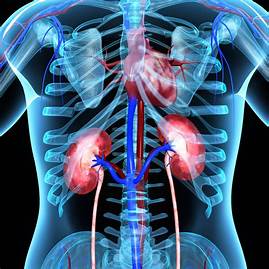|
Chronic Kidney Disease By Pierre Mouchette | Bits-n-Pieces What Is Chronic Kidney Disease (CKD)?
It is a condition that occurs when the kidneys do not work as they should to filter waste, toxins, and excess fluids from the body. ‘Chronic’ means an ongoing condition requiring long-term medical care to look after your health. Kidney disease develops in five stages and may lead to End-Stage Renal Disease (ESRD) or renal failure. The objective of treating CKD is to manage your health at every stage best, which can help to slow progression and maintain your kidney's performance as long as possible. ESRD treatment options for kidney failure include kidney transplant or dialysis, which may help people live for decades. Facts about kidney disease
What are the signs and symptoms of kidney disease? Kidney disease is difficult to detect in its early stages because people do not experience the symptoms until they are in later stages. CKD symptoms and signs include changes in urination, fatigue, itching, back pain, or swelling of the hands or feet. To best understand your kidney health, request a blood test to measure your estimated glomerular filtration rate (eGFR). An eGFR evaluates how well your kidneys filter waste, toxins, and excess fluid from your body. Your eGFR will help your doctor to ascertain if you have kidney disease and, if so, what stage you may be in. Are you at risk for kidney disease? Certain factors put you at a higher risk for CKD, including your family history, certain health conditions, ethnicity, or overuse of medications. Take action early, and diagnosis is critical! Get screened for CKD if you have any known risk factors, including diabetes or high blood pressure. What causes CKD? Many factors can contribute to kidney disease, diabetes, and high blood pressure. Even people who’ve taken excellent care of their health can be at risk for CKD. How is kidney disease diagnosed? Early detection is critical to slowing CKD progression and preserving kidney function. Make testing a priority! If you are at risk for CKD, talk to your doctor about monitoring your kidney health. Your doctor can determine if you have kidney disease by calculating your eGFR using creatinine blood test results and other health information about you. If your eGFR falls within the later stages of kidney disease, you will be referred to a kidney doctor (nephrologist) to help manage your kidney health.
0 Comments
Your comment will be posted after it is approved.
Leave a Reply. |
Archives
May 2024
|
